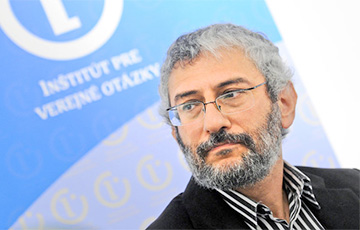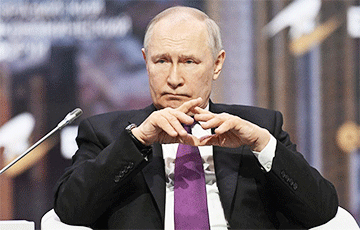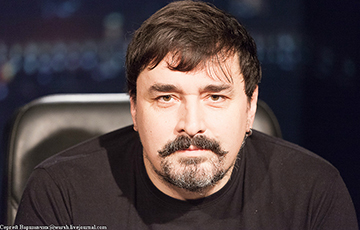Grigorij Mesežnikov: It Will Be Hard for Lukashenka to Retain Power
18- 25.05.2022, 15:55
- 24,836

How is the post-Soviet space re-organised to ensure security in Europe?
Why was the West unable to prevent the Kremlin's aggression against Ukraine? Was it possible to avoid using the territory of Belarus as a springboard for an attack? How to re-organise the post-Soviet space to ensure security in the region?
Slovak political scientist and president of the Institute of Social Problems (IVO) (Bratislava) Grigorij Mesežnikov answered these and other questions for Charter97.org.
- How has Europe changed after Putin's Russia attacked Ukraine?
- There has been an increased awareness of the danger posed by Putin's regime. The actions that the EU and NATO countries have taken and continue to take confirm this. Countries that, before the hot phase of the conflict, had doubted or refused to support Ukraine massively with arms, have assessed the situation as dangerous for the survival of democracy and stability in Europe. They have changed their views and are now active in providing Ukraine with the most effective weapons.
In addition, there has been a change in the political life of European countries: those who were considered to be agents of Russian policy on the political arena in certain countries, in France, Germany and others, are now being de-masked. I think it should affect the level of their public support.
Former politicians who were also active agents of Russian influence, cooperate directly with and benefit from the Russian regime, have now lost ground. The situation has deteriorated for Schröder, Kneissl, and some French politicians. And there is even an opinion that these people, given the things they have done, should be subjected to sanctions by the European Union.
Attitudes towards the Russian state have changed for the worse, and the support for Ukraine has become unprecedented in its strength. I would say it is such a tectonic shift.
Again, I don't want to oversimplify the situation. There are people among European politicians with milder views. They still hold relatively moderate positions on Russia. Nevertheless, the common direction is quite obvious. There are already indications in the UK that it may help Ukraine in the event of a radical development of the situation. Not by supplying arms but by direct participation in military action.
- Why did the West miss the Kremlin's aggression against Ukraine and have to play by ear?
- There was a great underestimation, a misunderstanding that this regime is not capable to negotiate, its ultimate goal is not only to conquer Ukraine but also to destroy the process of European integration. It is clear that he has many different objectives there: Putin's attitude towards Ukraine, that it supposedly should not exist, then his whole concept, his whole narrative that the collapse of the Soviet Union was the biggest geopolitical catastrophe of the 20th century, that the West is Russia's deadly enemy.
The ultimatum that was delivered in December 2021 [the ultimatum on security guarantees - ed.] was absurd. I think the West did not understand enough who it was dealing with. It was not just a blackmail attempt but actually part of Putin's Russian strategy of weakening the West and destroying the integration ties that emerged in the West after World War II.
I agree the West underestimated the situation. As for whether they missed it or not, they had information from intelligence. However, it was just before the invasion. But before that, the political West underpredicted the situation, and those imposed sanctions over the last eight years (several rounds of such personal and economic sanctions) were insufficient. Even now, after five rounds of new sanctions, Russia is somehow managing to stay afloat. However, I don't think the West is going to make that mistake now.
- What sanctions could finish off Putin's war machine?
- First of all, economic ones. These are oil and gas embargoes, all kinds of restrictions, isolation. I would like to note that while before the main strategic direction of Western policy towards Russia was isolation, maybe not complete, limited, now it has come to the point of exclusion. Russia is now no longer regarded as a state that can be a member of any organisations, programmes or projects. Russia is simply excluded.
By the way, they started to exclude themselves, intend to leave the World Trade Organization and some other international structures. I think they are getting ready to get kicked out of these organizations. So they want to present it to their internal audience in such a way that they are proactively cutting ties with the West, which is hostile and so on.
In fact, the West has already understood it is difficult to coexist with this state, with this regime. This, by the way, is a very difficult and complex issue that the West will have to address in the near future. To decide what to do after this war is over. So far, we do not know what will happen when this war ends. But what to do with Putin's regime that, let's say, loses? What will be done with such a political regime when some peace is established, i.e. when the war is over? This regime is still participating in the UN as a permanent member of the Security Council.
It is a situation that has never been seen before in modern history. In the past, such regimes, like Nazi Germany, they simply ceased their existence. There was no Third Reich after the Second World War; Germany became a different state.
How does the world relate to this state, which is likely to exist under the same name and there will be no change in the essence, in the nature of this regime?
In principle, it is a fascist state, an expansionist one, aggressive, aiming at occupation of neighbouring states, hostile to other states, democracy, freedom.... What should be done with this State? I think this is a very difficult question for the West to solve.
I think the West has not got up to it yet. However, it makes sense to consider a new global system of international relations. If the UN fails to do something about this rule-breaking state, if it fails to deal with it somehow, then some kind of alternative global structure should appear.
- What would it look like?
- It's a community of, firstly, democratic states, and secondly, states that may not even be fully democratic, but respect the norms of international law. There will be a transition period, states of this type will leave the UN and create a new international organization that will only accept those that will adhere to these norms and rules, so that Russia is not present there. Apparently its allies will not join it either - Belarus under Lukashenka's current regime, Nicaragua, maybe a couple of states.
The Chinese issue is questionable. But it will also be a matter for China to consider and decide with whom it, with whom it is more profitable for China to stay: either with the majority of countries with a normal attitude to the norms of international law, or to be in the same boat with this fascist, dictatorial, expansionist regime.
We are living in a time when anything can happen. For months now, experts have been thinking about how to resolve the situation with the same nuclear blackmail of Russia. It used to be taken on a purely hypothetical plane. Now it is no longer something that was hard to imagine. Compared with this, the creation of a new global structure does not seem so impossible anymore, and maybe it would even be the best solution.
The Russian regime's veto power is effectively blocking important international issues, including those related directly to its own actions. Russia today is a rogue state. I think we can legitimately use this term today. A rogue state with a veto power in the UN Security Council is a disaster for world development. So, something would have to be done about it.
- The West also had no strategy regarding Belarus. Was it possible to avoid an attack by Russian troops from the territory of Belarus?
- After 2020, Lukashenka usurped power. His legitimacy is now zero; he is holding on to bayonets now. I don't think the West could have concluded some informal agreement with Lukashenka or something like that, that he would not take part in these Russian adventures. However, few expected such a Russian adventure.
The expectation that there might be an attack from Belarusian territory was not the most widespread, it was a very unpleasant surprise. Although it was obvious to those who followed the situation more closely and dealt with the issues in detail that Putin would insist on using the territory of Belarus for his aggression. Moreover, there is formally a "union state of Russia and Belarus". I consider this a pseudo-justification of Putin's use of the territory of neighbouring Belarus. "Union State" is a chimera that has no subjectivity at the international level, it is purely a political solution for closer cooperation between the regimes of Russia and Belarus. Putin has taken advantage of this. In this particular situation, the West probably had no opportunity to influence Lukashenka.
- Why are voices in the USA and Europe saying again that bargaining must be conducted with Lukashenka, sanctions must be lifted in exchange for some concessions. For example, if he allows Ukrainian grain to go through the territory of Belarus.
- If such an offer is made, Lukashenka will agree to it, he is a known player and manipulator. As far as I have heard, we are only talking about a temporary lifting of these sanctions.
However, a plan to create safe sea corridors in the Black Sea is now being worked out. I think the West is stronger here than Russia after all. Everything that Russia is doing in Ukraine is totally illegal, and contrary to international law. However, their actions in the Black Sea are beyond any limits. Why is Russia blocking Ukrainian ports? It is not only a blockade of Ukrainian ports, it is a blockade of all other countries, they simply cannot enter these ports. And this creates a crisis regarding food supplies to countries that need it. So we have to wait, I think the West will take some measures and maybe there will be no need to soften sanctions against Lukashenka's regime,
It seems to me Russia will not go for strong escalation, its Black Sea Fleet is just some small vessels compared to what can appear there within a couple of days by NATO. The combined naval forces of the alliance will simply go in there, that the Black Sea Fleet in case of careless and imprudent actions by Russia may simply cease to exist. If that grain is not delivered, some 600 million people in the world will starve. It is clear what this will mean for Europe. There will be a big influx of refugees. The events of 2015-2016 will seem like just a minor incident, it will be tens of millions of refugees, if not more.
- What chance for the people of Belarus could the defeat of the Kremlin in Ukraine give?
- This will be crucial. It is quite obvious that Lukashenka is holding on not only to his Praetorian Guard but also to Russian bayonets. And if there is any regime change in Russia apart from a military defeat, the Belarusians will show their strength again - something that happened in August 2020.
A defeat for Russia would in any case be positive for all. The level of danger posed by this regime will be reduced after all, and the West will be watching what happens more closely after that.
Even if there are no radical changes in the Kremlin, Lukashenka will be weaker. But if strong changes take place there, even if they do not lead to a total change of power, someone from the current entourage of more moderate people will come to power in Moscow, then the Kremlin's support for Lukashenka will be weaker. They will have other things to do to maintain stability in Russia.
Attention to Lukashenka will diminish, and Belarusian society can continue what was broken in 2020, when it was possible to overthrow this regime.
Belarusian society then showed that it was overwhelmingly against Lukashenka. He managed to stop it thanks to support from the Kremlin. The Belarusians haven't forgotten what happened in August 2020. It really was a people's revolution, which unfortunately did not lead to the downfall of the regime. However, if the things I have described happen, it will be much easier for the Belarusians. Society will be stronger, given the experience of 2020, specific political developments, and it will be difficult for the Lukashenka regime to remain in power.
- How can the post-soviet space be reorganized to provide security in the region and economic development of the countries?
- One way is to move away from the so-called integration schemes with Russia. This is not integration at all but simply domination by the Kremlin. The use of force to impose Kremlin-friendly regimes in these countries, the suppression of freedom, corruption and so on. Countries that are in so-called integration alliances with Russia need to leave them. This is the first task. And the second one is to carry out reforms and cooperate with those states or organizations, which have social and political systems, to which these countries aspire.
Maybe, this aspiration is different everywhere but it seems to me that for Belarus it is now absolutely clear that the future of this country lies only in a partnership with the West and in direct connection to the process of European integration. It sounded like that in 2020 but not so expressively. At that time, there was a rebirth of the Belarusian political nation, and the question of the European perspective was less sounded at that time. People who represented Belarus on the international stage spoke about a kind of equidistance, about the desire to cooperate with all, including Russia, about a multi-vector foreign policy.
I believe those were illusions. How can one talk about equidistance or multi-vector policy, if there is an aggressor country that wants to devour you, roughly speaking, and there is also a community of democratic states that want to help you, establish equal relations with you. Now, of course, this pro-European direction is absolutely clear in the democratic circles of Belarus. And there will be no problems with it once the situation in Russia and Belarus changes.











